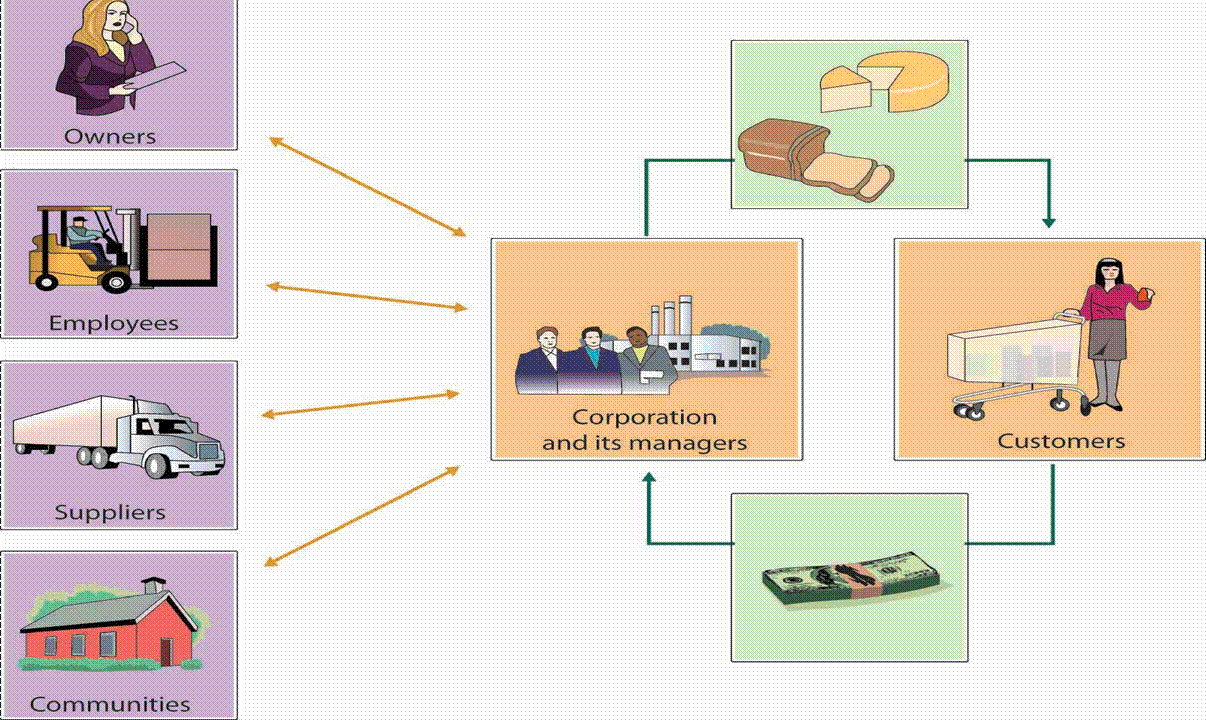
Business Ethics and
Social Responsibility
•Define business ethics and explain what it means to act ethically in business.
•Explain how you can recognize an ethical organization
Business ethics
Business ethics is the application of ethical behavior in a business context.
Acting ethically in business means more than simply obeying applicable laws and regulations. It also means
• being honest
• doing no harm to others
• competing fairly
• declining to put your own interests above those of your company, its owners, and its workers
If you’re in business you obviously need a strong sense of what’s right and what’s wrong (not always an easy task).
•Approach that an organization takes in balancing its responsibilities toward different stakeholders when making legal, economic, ethical, and social decisions
•Corporate social responsibility deals with actions that affect a variety of parties in a company’s environment. A socially responsible company shows concern for its stakeholders—anyone who, like owners, employees, customers, and the communities in which it does business, has a “stake” or interest in it.
 |
•Provide jobs
•Pay taxes
• Support local education, health, and recreation activities
•Donate funds to community projects
•Encourage employees to volunteer their time
• Donate equipment and products for a variety of activities
•Companies have a responsibility to guard workers’ safety and health and to provide them with a work environment that’s free from harassment.
•Businesses should pay appropriate wages and benefits, treat all workers fairly, and provide equal opportunities for all employees.
The rights of consumers were first articulated by
President John F. Kennedy in 1962
• The right to safe products. A company should sell no product that it suspects of being unsafe for buyers. Thus, producers have an obligation to safety-test products before releasing them for public consumption. The automobile industry, for example, conducts extensive safety testing before introducing new models (though recalls remain common).
• The right to be informed about a product. Sellers should furnish consumers with the product information that they need to make an informed purchase decision. That’s why pillows have labels identifying the materials used to make them, for instance.
•The right to choose what to buy. Consumers have a right to decide which products to purchase, and sellers should let them know what their options are. Pharmacists, for example, should tell patients when a prescription can be filled with a cheaper brand-name or generic drug. Telephone companies should explain alternative calling plans.
•The right to be heard. Companies must tell customers how to contact them with complaints or concerns.
They should also listen and respond.
• Treating employees, customers, investors, and the public fairly
• Making fairness a top priority
• Holding every member personally accountable for his or her action
• Communicating core values and principles to all members
• Demanding and rewarding integrity from all members in all situations
(Alan Axelrod, My First Book of Business Ethics)
•a morally problematic situation in which you must choose between two or more alternatives that aren’t equally acceptable to different groups.
When you make a decision that’s unmistakably unethical or illegal, you’ve committed an ethical lapse.
When you are in doubt, ask yourself:
• Is the action illegal?
• Is it unfair to some parties?
• If I take it, will I feel bad about it?
• Will I be ashamed to tell my family, friends, coworkers, or boss about my action?
• Would I want my decision written up in the local newspaper?
If you answer yes to any one of these five questions, you’re probably about to do something that you shouldn’t.
Do you know the answer?
•Is it okay to accept a pair of sports tickets from a supplier?
•Can I buy office supplies from my brother-in-law?
•Is it appropriate to donate company funds to my local community center?
•If I find out that a friend is about to be fired, can I warn her?
•Will I have to lie about the quality of the goods I’m selling?
• Can I take personal e-mails and phone calls at work?
•What do I do if I discover that a coworker is committing fraud?
•Overview of the lecture
•Identify ethical issues that you might face in business
•What can individuals, organizations, and government agencies do to foster an environment of ethical and socially responsible behavior in business?
Материалы на данной страницы взяты из открытых источников либо размещены пользователем в соответствии с договором-офертой сайта. Вы можете сообщить о нарушении.